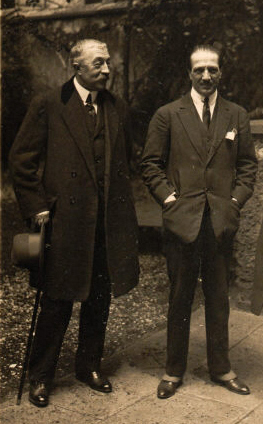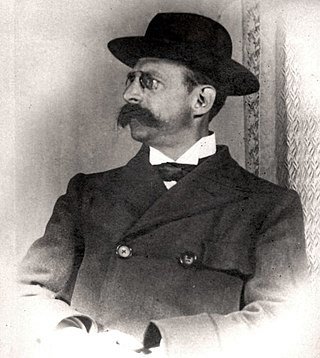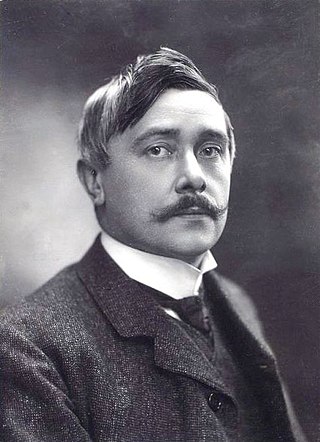
Jules-Jean-Paul Fort was a French poet associated with the Symbolist movement. At the age of 18, reacting against the Naturalistic theatre, Fort founded the Théâtre d'Art (1890–93). He also founded and edited the literary reviews Livre d'Art with Alfred Jarry and Vers et Prose (1905–14) with poet Guillaume Apollinaire, which published the work of Paul Valéry and other important Symbolist writers. Fort is notable for his enormous volume of poetry, having published more than thirty volumes of ballads and, according to Amy Lowell, for creating the polyphonic prose form in his 'Ballades francaises'.

Maurice Polydore Marie Bernard Maeterlinck, also known as Count/ComteMaeterlinck from 1932, was a Belgian playwright, poet, and essayist who was Flemish but wrote in French. He was awarded the Nobel Prize in Literature in 1911 "in appreciation of his many-sided literary activities, and especially of his dramatic works, which are distinguished by a wealth of imagination and by a poetic fancy, which reveals, sometimes in the guise of a fairy tale, a deep inspiration, while in a mysterious way they appeal to the readers' own feelings and stimulate their imaginations". The main themes in his work are death and the meaning of life. He was a leading member of La Jeune Belgique group, and his plays form an important part of the Symbolist movement. In later life, Maeterlinck faced credible accusations of plagiarism.

René Émile Char was a French poet and member of the French Resistance.

Charles Martin Tornov Loeffler was a German-born American violinist and composer.
Richard Joseph Howard, adopted as Richard Joseph Orwitz, was an American poet, literary critic, essayist, teacher, and translator. He was born in Cleveland, Ohio, and was a graduate of Columbia University, where he studied under Mark Van Doren, and where he was an emeritus professor. He lived in New York City.

Maurice Charles Delage was a French composer and pianist.

Pierre Eugène Onfroy de Bréville was a French composer.

Pierre Reverdy was a French poet whose works were inspired by and subsequently proceeded to influence the provocative art movements of the day, Surrealism, Dadaism and Cubism. The loneliness and spiritual apprehension that ran through his poetry appealed to the Surrealist credo. He, though, remained independent of the prevailing "-isms", searching for something beyond their definitions. His writing matured into a mystical mission seeking, as he wrote: "the sublime simplicity of reality."

Les XX was a group of twenty Belgian painters, designers and sculptors, formed in 1883 by the Brussels lawyer, publisher, and entrepreneur Octave Maus. For ten years, they held an annual exhibition of their art; each year 20 other international artists were also invited to participate in their exhibition. Painters invited include Camille Pissarro, Claude Monet, Georges Seurat, Paul Gauguin, Paul Cézanne (1890), and Vincent van Gogh.

Charles van Lerberghe was a Belgian author who wrote in French and was particularly identified with the symbolist movement. The growing atheism and anticlerical stance evident in his later work made it popular among those who challenged establishment norms at the start of the 20th century.

Georgette Leblanc was a French operatic soprano, actress, author, and the sister of novelist Maurice Leblanc. She became particularly associated with the works of Jules Massenet and was an admired interpreter of the title role in Bizet's Carmen.

Tristan Klingsor, birth name Léon Leclère, was a French poet, musician, painter and art critic, best known for his artistic association with the composer Maurice Ravel.
Literaturoper, a term coined by the German music critic Edgar Istel, describes a genre of opera that emerged during the late 19th century. When an existing play for the legitimate theatre is set to music without major changes and without the intervention of a librettist, a “Literaturoper” is the result. Although the term is German, it can be applied to any kind of opera, irrespective of style or language.

Intruder is a one-act play by Belgian playwright Maurice Maeterlinck, which appeared first in publication in 1890. Journalistic appreciations of the text throughout that year prompted Parisian independent theatre producers to get the performance rights. From its stage debut the following spring, it became identified as a landmark work in the Symbolism movement of the late-nineteenth century.

Cœur de verre is the name of the first studio album recorded by the French singer Hélène Ségara. It was released in 1996, after its first hit single, "Je vous aime adieu", and achieved success in France and Belgium (Wallonia). It provided eight singles, including three hits.
Herzgewächse, Op. 20, is a composition by Austrian composer Arnold Schoenberg scored for coloratura soprano, celesta, harmonium, and harp. The text is taken from a poem of the same name by Maurice Maeterlinck. The duration of the work is approximately three-and-a-half minutes, making it the shortest of Schoenberg's works with its own opus number. The work is also notable for the extreme demands made on the singer which at one point has to ascend to a high F (pianissimo), nearly two-and-a-half octaves above middle C.

The Blue Bird is an oil painting created in 1912–1913 by the French artist and theorist Jean Metzinger. L'Oiseau bleu, one of Metzinger's most recognizable and frequently referenced works, was first exhibited in Paris at the Salon des Indépendants in the spring of 1913, several months after the publication of the first Cubist manifesto, Du "Cubisme", written by Jean Metzinger and Albert Gleizes (1912). It was subsequently exhibited at the 1913 Erster Deutscher Herbstsalon in Berlin.
Events in the year 1893 in Belgium.

The 1911 Nobel Prize in Literature was awarded to the Belgian author Maurice Maeterlinck (1862–1949) "in appreciation of his many-sided literary activities, and especially of his dramatic works, which are distinguished by a wealth of imagination and by a poetic fancy, which reveals, sometimes in the guise of a fairy tale, a deep inspiration, while in a mysterious way they appeal to the readers' own feelings and stimulate their imaginations." He is the first and remains only the Belgian recipient of the prize.
















